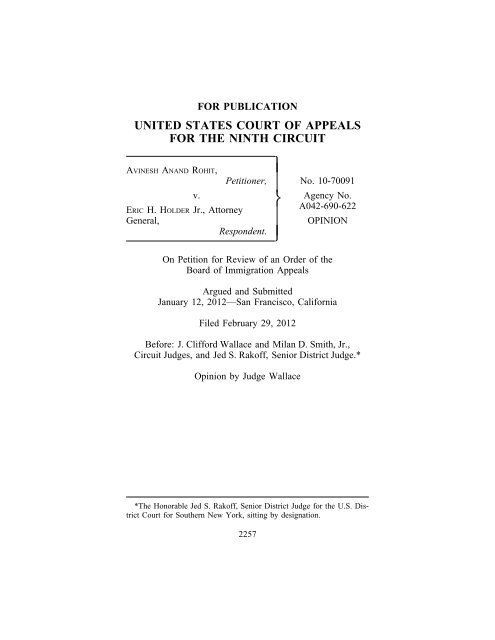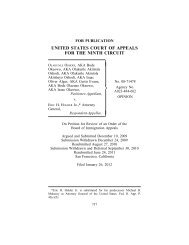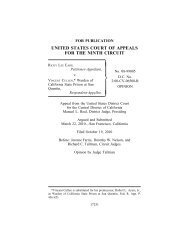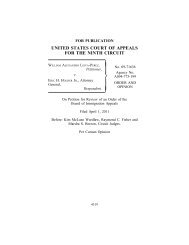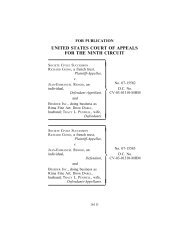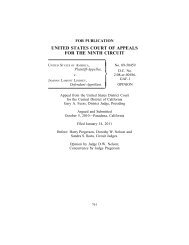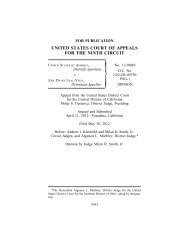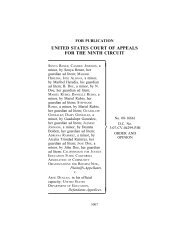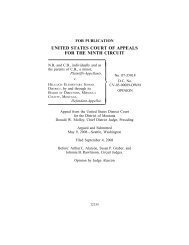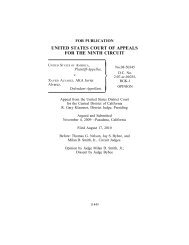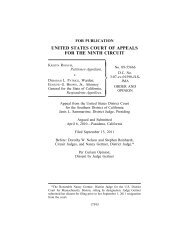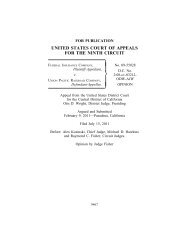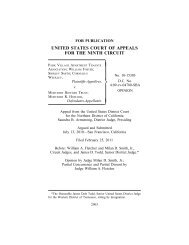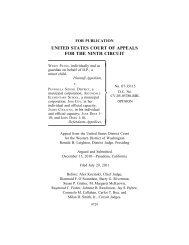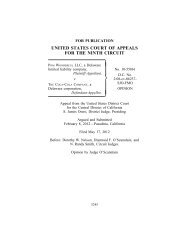ROHIT v. HOLDER - Ninth Circuit Court of Appeals
ROHIT v. HOLDER - Ninth Circuit Court of Appeals
ROHIT v. HOLDER - Ninth Circuit Court of Appeals
Create successful ePaper yourself
Turn your PDF publications into a flip-book with our unique Google optimized e-Paper software.
FOR PUBLICATION<br />
UNITED STATES COURT OF APPEALS<br />
FOR THE NINTH CIRCUIT<br />
AVINESH ANAND <strong>ROHIT</strong>,<br />
Petitioner, No. 10-70091<br />
v. Agency No.<br />
A042-690-622<br />
ERIC H. <strong>HOLDER</strong> Jr., Attorney<br />
General, OPINION<br />
Respondent.<br />
On Petition for Review <strong>of</strong> an Order <strong>of</strong> the<br />
Board <strong>of</strong> Immigration <strong>Appeals</strong><br />
Argued and Submitted<br />
January 12, 2012—San Francisco, California<br />
Filed February 29, 2012<br />
Before: J. Clifford Wallace and Milan D. Smith, Jr.,<br />
<strong>Circuit</strong> Judges, and Jed S. Rak<strong>of</strong>f, Senior District Judge.*<br />
Opinion by Judge Wallace<br />
*The Honorable Jed S. Rak<strong>of</strong>f, Senior District Judge for the U.S. District<br />
<strong>Court</strong> for Southern New York, sitting by designation.<br />
2257
<strong>ROHIT</strong> v. <strong>HOLDER</strong><br />
COUNSEL<br />
Raul Ray and Katarina Rost, Law Office <strong>of</strong> Raul Ray, San<br />
Jose, California, for the petitioner.<br />
Nancy K. Canter and Laura Halliday Hickein, Office <strong>of</strong><br />
Immigration Litigation, United States Department <strong>of</strong> Justice,<br />
Washington, D.C., for the respondent.<br />
OPINION<br />
WALLACE, Senior <strong>Circuit</strong> Judge:<br />
Avinesh Anand Rohit petitions for review <strong>of</strong> a decision <strong>of</strong><br />
the Board <strong>of</strong> Immigration <strong>Appeals</strong> (Board) denying his application<br />
for voluntary departure. We have jurisdiction under 8<br />
U.S.C. § 1252, and we deny the petition.<br />
I.<br />
2259<br />
Rohit was convicted for disorderly conduct involving prostitution<br />
under California Penal Code § 647(b) and attempting<br />
to dissuade a witness or victim under California Penal Code<br />
§ 136.1(c).
2260 <strong>ROHIT</strong> v. <strong>HOLDER</strong><br />
In Rohit’s removal proceeding, the immigration judge (IJ)<br />
held that these statutes categorically constitute crimes involving<br />
moral turpitude, making Rohit removable under 8 U.S.C.<br />
§ 1227(a)(2)(A)(ii). The IJ denied Rohit’s application for<br />
relief in the form <strong>of</strong> asylum, withholding <strong>of</strong> removal, and protection<br />
under the Convention Against Torture, but did not<br />
address his request for voluntary departure. The Board<br />
affirmed the IJ’s decision, but remanded for the IJ to address<br />
Rohit’s request for voluntary departure.<br />
On remand the IJ denied voluntary departure, and the<br />
Board dismissed the appeal that followed. Rohit petitioned<br />
this court for review <strong>of</strong> each <strong>of</strong> the preceding decisions. We<br />
denied the petition for review as to his request for asylum,<br />
withholding <strong>of</strong> removal, and relief under the Convention<br />
Against Torture, but held that the Board had overlooked<br />
Rohit’s argument that disorderly conduct involving prostitution<br />
does not involve moral turpitude. We remanded to the<br />
Board to determine whether disorderly conduct involving<br />
prostitution involves moral turpitude.<br />
On remand, the Board held that disorderly conduct involving<br />
prostitution is a crime involving moral turpitude. Relying<br />
on its prior holding that dissuading a witness or victim<br />
involves moral turpitude, the Board held that Rohit was<br />
removable under 8 U.S.C. § 1227(a)(2)(A)(ii) for committing<br />
two crimes involving moral turpitude. Rohit now petitions us<br />
for review, arguing that he is not removable because disorderly<br />
conduct involving prostitution is not a crime involving<br />
moral turpitude.<br />
II.<br />
We are asked to determine whether violation <strong>of</strong> California<br />
Penal Code § 647(b) is a crime involving moral turpitude<br />
under 8 U.S.C. § 1227(a)(2)(A)(ii). When the Board has<br />
issued a decision interpreting ambiguous terms in the Immigration<br />
and Naturalization Act, we review its decision with
<strong>ROHIT</strong> v. <strong>HOLDER</strong><br />
2261<br />
some level <strong>of</strong> deference. Marmolejo-Campos v. Holder, 558<br />
F.3d 903, 909 (9th Cir. 2009) (en banc).<br />
Congress has plenary power over immigration. United<br />
States v. Hernandez-Guerrero, 147 F.3d 1075, 1076 (9th Cir.<br />
1998). “ ‘[O]ver no conceivable subject is the legislative<br />
power <strong>of</strong> Congress more complete than it is over’ the admission<br />
<strong>of</strong> aliens.” Fiallo v. Bell, 430 U.S. 787, 792 (1977), quoting<br />
Oceanic Navigation Co. v. Stranahan, 214 U.S. 320, 339<br />
(1909). In adopting the Immigration and Naturalization Act,<br />
Congress delegated significant authority to promulgate rules<br />
relating to immigration to the Attorney General and the<br />
Board. Garcia v. Holder, 659 F.3d 1261, 1266 (9th Cir.<br />
2011); see also 8 U.S.C. § 1103(g). In light <strong>of</strong> this delegation,<br />
our first task in reviewing any decision by the Board is to<br />
determine the proper level <strong>of</strong> deference to which the Board is<br />
entitled.<br />
We give significant deference to the Board “(1) ‘when it<br />
appears that Congress delegated authority to the agency generally<br />
to make rules carrying the force <strong>of</strong> law,’ and when (2)<br />
‘the agency interpretation claiming deference was promulgated<br />
in the exercise <strong>of</strong> that authority.’ ” Marmolejo-Campos,<br />
558 F.3d at 908, quoting United States v. Mead Corp., 533<br />
U.S. 218, 226-27 (2001). Under these circumstances, we must<br />
accept the Board’s interpretation if it is “ ‘based on a permissible<br />
construction <strong>of</strong> the statute.’ ” Id. at 909, quoting Chevron<br />
U.S.A., Inc. v. Natural Res. Def. Council, Inc., 467 U.S.<br />
837, 843 (1984). Because the term “moral turpitude” is “the<br />
quintessential example <strong>of</strong> an ambiguous phrase,” id., we<br />
apply Chevron deference to the Board’s interpretations <strong>of</strong> that<br />
term in its precedential decisions. Id. at 911. Where the Board<br />
has determined “that certain conduct is morally turpitudinous<br />
in a precedential decision, we apply Chevron deference<br />
regardless <strong>of</strong> whether the order under review is the precedential<br />
decision itself or a subsequent unpublished order that<br />
relies upon it.” Id.
2262 <strong>ROHIT</strong> v. <strong>HOLDER</strong><br />
On the other hand, when the Board issues an unpublished<br />
opinion that interprets a statute without relying on a published<br />
opinion, we give the decision less deference. Id. at 909. That<br />
level <strong>of</strong> deference “varies ‘depend[ing] upon the thoroughness<br />
evident in [the opinion’s] consideration, the validity <strong>of</strong> its reasoning,<br />
its consistency with earlier and later pronouncements,<br />
and all those factors which give it power to persuade, if lacking<br />
power to control.’ ” Id., quoting Skidmore v. Swift & Co.,<br />
232 U.S. 134, 140 (1944).<br />
The Board’s decision here was unpublished, so its decision<br />
that the conduct at issue involved moral turpitude is entitled<br />
to Chevron deference only if it relies on a published decision<br />
—that is, if a published decision addressed the same issue.<br />
See Garcia-Quintero v. Gonzales, 455 F.3d 1006, 1014 (9th<br />
Cir. 2006). The Attorney General does not assert that the<br />
Board has ever found, in a published opinion, that solicitation<br />
<strong>of</strong> prostitution is a crime involving moral turpitude. Rather, he<br />
argues that this result flows naturally from precedential cases<br />
holding that prostitution involves moral turpitude, see W., 4<br />
I. & N. Dec. 401, 401-02 (Bd. Immigration <strong>Appeals</strong> 1951),<br />
and that facilitating prostitution by renting a room with the<br />
knowledge that it will be used for prostitution involves moral<br />
turpitude, see Lambert, 11 I. & N. Dec. 340, 342 (Bd. Immigration<br />
<strong>Appeals</strong> 1965). While these cases may support the<br />
Board’s decision on the merits, they do not make its decision<br />
precedential. Because the Board has not decided in a precedential<br />
case whether Rohit’s conduct involves moral turpitude,<br />
we apply Skidmore deference to its non-precedential<br />
decision that it does. Marmolejo-Campos, 558 F.3d at 909-11.<br />
III.<br />
[1] We now address whether California Penal Code<br />
§ 647(b), which prohibits disorderly conduct involving prostitution,<br />
is categorically a crime involving moral turpitude. As<br />
set forth in Taylor v. United States, 495 U.S. 575 (1990), to<br />
determine whether section 647(b) is a crime involving moral
<strong>ROHIT</strong> v. <strong>HOLDER</strong><br />
2263<br />
turpitude under 8 U.S.C. § 1227(a)(2)(A)(ii), we first employ<br />
the categorical approach and, if the statutes are not a “categorical<br />
match,” we apply a modified categorical approach.<br />
Marmolejo-Campos, 558 F.3d at 912.<br />
[2] Under the categorical approach, we compare the statute<br />
<strong>of</strong> conviction to the generic definition <strong>of</strong> moral turpitude. Id.<br />
If the statute bans only actions that involve moral turpitude,<br />
then it is categorically a crime involving moral turpitude. Id.<br />
In other words, California Penal Code section 647(b) is a<br />
“categorical match” with 8 U.S.C. § 1227(a)(2)(A)(ii) unless<br />
there is “a realistic probability, not a theoretical possibility,<br />
that the State would apply its statute to conduct that falls outside<br />
the generic definition” <strong>of</strong> moral turpitude. Gonzales v.<br />
Duenas-Alvarez, 549 U.S. 183, 193 (2007).<br />
[3] The generic definition <strong>of</strong> “crimes involving moral turpitude”<br />
encompasses crimes that “are base, vile, or depraved<br />
—if they <strong>of</strong>fend society’s most fundamental values, or shock<br />
society’s conscience.” Navarro-Lopez v. Gonzales, 503 F.3d<br />
1063, 1074 (9th Cir. 2007) (en banc) (Reinhardt, J., concurring,<br />
writing for the majority), overruled on other grounds by<br />
United States v. Aguila-Montes de Oca, 655 F.3d 915 (9th<br />
Cir. 2011) (en banc). “[I]n general, such <strong>of</strong>fenses are those<br />
that are intrinsically wrong (malum in se) or require evil<br />
intent.” Mendoza v. Holder, 623 F.3d 1299, 1302 (9th Cir.<br />
2010), citing Uppal v. Holder, 605 F.3d 712, 716 n.2 (9th Cir.<br />
2010). However, these definitions are too general to be <strong>of</strong><br />
much assistance in every case. Therefore, it is <strong>of</strong>ten helpful to<br />
“determine whether a state crime involves moral turpitude by<br />
comparing it with crimes that have previously been found to<br />
involve moral turpitude.” Id., citing Nunez v. Holder, 594<br />
F.3d 1124, 1131 & n.4 (9th Cir. 2010).<br />
[4] The Board has, in precedential decisions, identified<br />
certain crimes that involve moral turpitude that are quite similar<br />
to solicitation <strong>of</strong> prostitution, including “any act <strong>of</strong> prostitution,<br />
assignation, or any other lewd or indecent act,” W., 4
2264 <strong>ROHIT</strong> v. <strong>HOLDER</strong><br />
I. & N. Dec. at 401-02, 404; renting a room with the knowledge<br />
that it will be used for “lewdness, assignation or prostitution.”<br />
Lambert, 11 I. & N. Dec. at 342; and “keeping a<br />
house <strong>of</strong> ill-fame resorted to for the purposes <strong>of</strong> prostitution<br />
and lewdness.” Id., citing P., 3 I. & N. Dec. 20 (1947). These<br />
Board decisions are entitled to Chevron deference and are certainly<br />
permissible interpretations <strong>of</strong> the statute.<br />
On the other hand, we have also identified examples <strong>of</strong><br />
crimes that do not categorically involve moral turpitude, such<br />
as public exposure, Nunez, 594 F.3d at 1138; and consensual<br />
intercourse between a 15-year-old and a 21-year-old,<br />
Quintero-Salazar v. Keisler, 506 F.3d 688, 693-94 (9th Cir.<br />
2007).<br />
[5] Rohit was convicted for disorderly conduct involving<br />
solicitation <strong>of</strong> prostitution under California Penal Code<br />
§ 647(b), which reads:<br />
[E]very person who commits any <strong>of</strong> the following<br />
acts is guilty <strong>of</strong> disorderly conduct, a misdemeanor:<br />
. . .<br />
(b) Who solicits or who agrees to engage in or who<br />
engages in any act <strong>of</strong> prostitution. A person agrees<br />
to engage in an act <strong>of</strong> prostitution when, with specific<br />
intent to so engage, he or she manifests an<br />
acceptance <strong>of</strong> an <strong>of</strong>fer or solicitation to so engage,<br />
regardless <strong>of</strong> whether the <strong>of</strong>fer or solicitation was<br />
made by a person who also possessed the specific<br />
intent to engage in prostitution. No agreement to<br />
engage in an act <strong>of</strong> prostitution shall constitute a violation<br />
<strong>of</strong> this subdivision unless some act, in addition<br />
to the agreement, is done within this state in furtherance<br />
<strong>of</strong> the commission <strong>of</strong> an act <strong>of</strong> prostitution by<br />
the person agreeing to engage in that act. As used in
<strong>ROHIT</strong> v. <strong>HOLDER</strong><br />
this subdivision, “prostitution” includes any lewd act<br />
between persons for money or other consideration.<br />
2265<br />
We hold that soliciting an act <strong>of</strong> prostitution is not significantly<br />
less “base, vile, and depraved” than engaging in an act<br />
<strong>of</strong> prostitution. Solicitation is the direct precursor to the act.<br />
A person who solicits an act <strong>of</strong> prostitution does not become<br />
appreciably more morally turpitudinous when the other party<br />
accepts or the two engage in the act. The base act is the<br />
intended result <strong>of</strong> the base request or <strong>of</strong>fer.<br />
[6] Solicitation <strong>of</strong> prostitution is also closely analogous to<br />
renting a room with the knowledge that it will be used for<br />
prostitution. Both are intended to facilitate the act <strong>of</strong> prostitution.<br />
There is no meaningful distinction that would lead us to<br />
conclude that engaging in an act <strong>of</strong> prostitution is a crime <strong>of</strong><br />
moral turpitude but that soliciting or agreeing to engage in an<br />
act <strong>of</strong> prostitution is not. Because California Penal Code<br />
§ 647(b) does not prohibit any conduct that does not also satisfy<br />
the generic definition <strong>of</strong> conduct involving moral turpitude,<br />
it is a “categorical match” with 8 U.S.C.<br />
§ 1227(a)(2)(A)(ii).<br />
While we have found that public exposure and statutory<br />
rape are not categorically crimes <strong>of</strong> moral turpitude, those<br />
decisions do not persuade us that the Board erred in this case.<br />
Public exposure and statutory rape have superficial similarities<br />
to solicitation <strong>of</strong> prostitution in that they involve sexual<br />
conduct, but they do not form a close analogy. Public exposure<br />
might be a crime <strong>of</strong> moral turpitude in circumstances<br />
under which “unwanted, sexually motivated exposure would<br />
be highly threatening, intrusive, and psychologically damaging<br />
to viewers,” Nunez, 594 F.3d at 1138, but we concluded<br />
that it was not categorically a crime involving moral turpitude<br />
because it encompassed conduct protected by the First<br />
Amendment and de minimis provocations. Id. at 1136-38.<br />
Rohit does not argue that solicitation <strong>of</strong> prostitution is protected<br />
speech or that it can involve de minimis acts <strong>of</strong> prosti-
2266 <strong>ROHIT</strong> v. <strong>HOLDER</strong><br />
tution. Rather, solicitation <strong>of</strong> prostitution is always base, vile,<br />
and depraved.<br />
Similarly, sex between an adult and a minor may be prohibited,<br />
but it is not inherently morally turpitudinous. As we recognized<br />
in Quintero-Salazar, the conduct criminalized by<br />
California’s statutory rape law was legal if the couple was<br />
married. 506 F.3d at 693. We also reasoned that the same conduct<br />
was legal in other states and that California’s purpose in<br />
passing the law was more pragmatic than moral—they were<br />
attempting to reduce teenage pregnancies. Id. Prostitution, on<br />
the other hand, and solicitation there<strong>of</strong>, always involves sexual<br />
exploitation. Our finding that statutory rape is not categorically<br />
a crime involving moral turpitude does not provide a<br />
close analogy to the crime <strong>of</strong> soliciting an act <strong>of</strong> prostitution.<br />
Rohit argues that solicitation <strong>of</strong> prostitution is not analogous<br />
to prostitution because prostitution <strong>of</strong>ten involves<br />
repeated acts <strong>of</strong> prostitution. This argument does not persuade<br />
us for two reasons. First, we owe Chevron deference to the<br />
Board’s decision in W., where it held that an ordinance that<br />
criminalized a single act <strong>of</strong> prostitution dealt with a crime<br />
involving moral turpitude. 4 I. & N. Dec. at 401-02, 404.<br />
Rohit <strong>of</strong>fers no authority for the proposition that acts <strong>of</strong> prostitution<br />
are only morally turpitudinous if repeated. If a single<br />
act <strong>of</strong> prostitution involves moral turpitude, there is no reason<br />
why a single act <strong>of</strong> solicitation <strong>of</strong> prostitution does not.<br />
Second, a crime that does not involve moral turpitude does<br />
not become a crime involving moral turpitude through repetition.<br />
See Matter <strong>of</strong> Short, 20 I. & N. Dec. 136, 139 (Bd.<br />
Immigration <strong>Appeals</strong> 1989) (“Moral turpitude cannot be<br />
viewed to arise from some undefined synergism by which two<br />
<strong>of</strong>fenses are combined to create a crime involving moral turpitude,<br />
where each crime individually does not involve moral<br />
turpitude.”). So whether solicitation <strong>of</strong> prostitution involves<br />
moral turpitude does not depend on how frequently a person<br />
engages in the act.
<strong>ROHIT</strong> v. <strong>HOLDER</strong><br />
Rohit also argues that California’s statute prosecutes crimes<br />
that would not be considered prostitution under the federal<br />
definition <strong>of</strong> prostitution applicable to 8 U.S.C.<br />
§ 1182(a)(2)(D)(I). See Gonzalez-Zoquiapan, 24 I. & N. Dec.<br />
549, 553 (Bd. Immigration <strong>Appeals</strong> 2008) (defining prostitution<br />
as “engaging in promiscuous sexual intercourse for hire,”<br />
which must be “continu[ous] and regular[ ], indicating a pattern<br />
<strong>of</strong> behavior or deliberate course <strong>of</strong> conduct entered into<br />
primarily for financial gain or for other considerations <strong>of</strong><br />
material value”). However, Rohit is not being removed for<br />
prostitution under section 1182(a)(2)(D)(I); he is being<br />
removed for committing two crimes involving moral turpitude<br />
under 8 U.S.C. § 1227(a)(2)(A)(ii). A crime does not have to<br />
meet the federal definition <strong>of</strong> prostitution in order to constitute<br />
a crime involving moral turpitude. See Gonzalez-<br />
Zoquiapan, 24 I. & N. Dec. at 554 (assuming that a violation<br />
<strong>of</strong> California Penal Code § 647(b) could constitute a crime<br />
involving moral turpitude even though it did not meet the definition<br />
<strong>of</strong> prostitution). Indeed, most crimes involving moral<br />
turpitude have nothing to do with prostitution.<br />
[7] The Board did not err in concluding that Rohit’s conviction<br />
under section 647(b) <strong>of</strong> the California Penal Code<br />
constituted a conviction <strong>of</strong> a crime involving moral turpitude.<br />
Because Rohit was convicted <strong>of</strong> two crimes involving moral<br />
turpitude, he was deportable under 8 U.S.C.<br />
§ 1227(a)(2)(A)(ii), and we deny his petition for review.<br />
PETITION FOR REVIEW DENIED.<br />
2267


